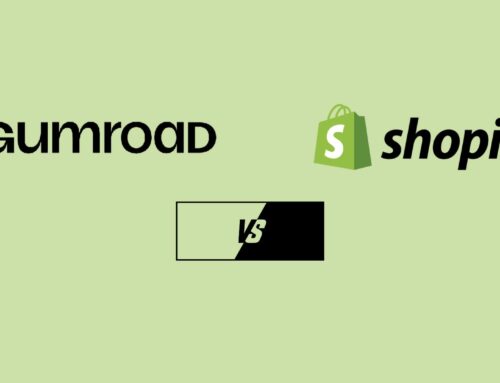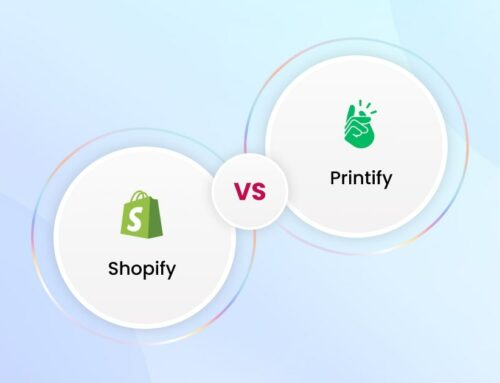Ecommerce platforms have led to a growing tendency for those who want to run an online business. With the power of necessary tools and ultimate platforms, entrepreneurs can take all advantages to boost sales and earn much money easily.
It raises the question of which one will you choose to start and facilitate your business? So, we’re here with another post in our series of Shopify comparisons so that you can pick the best fit for your online store.
Among a variety of digital platforms available, we wish to list out here the two most dominant and competitive rivals on the market: Shopify vs Volusion. You get to know a comparative review of both and make up your mind which one is outweighed.
Contents
- 1 Shopify vs Volusion Overview
- 2 Shopify vs Volusion: 7 Key Different Points
- 2.1 Shopify vs Volusion: Features
- 2.2 Shopify vs Volusion: Beginner-Friendly / Ease of Use
- 2.3 Shopify vs Volusion: Design Flexibility
- 2.4 Shopify vs Volusion: Add-Ons Integration
- 2.5 Shopify vs Volusion: Customer Support
- 2.6 Shopify vs Volusion: Performance
- 2.7 Shopify vs Volusion: Pricing & Transaction Fees
- 3 Shopify vs Volusion: Which Choice is Better for You?
Shopify vs Volusion Overview
Shopify Overview

Firstly, let’s take a look at Shopify, a commerce platform that opens a digital space for everyone to set up stores and retail products via the Internet. Shopify’s headquarters is located in Ottawa, Canada. Currently, it is a multinational company ranked one of the top eCommerce platforms globally, spreading million businesses in 175 countries.
In 2004, it was first founded by 3 Canadian entrepreneurs namely Tobias Lütke, Daniel Weinand, and Scott Lake after making all their effort to set up an online snowboarding equipment store. They felt unsatisfied with available e-commerce products so that one of them used his own open-source web application which was known as Shopify later on. Lutke, who made this breakthrough, becomes CEO of Shopify now.
Shopify focuses not only on virtual stores but also a point-of-sale system as well as a wide range of useful services to facilitate retailer’s experience such as marketing, payment processing, shipping, and customer engagement tools. It offers a huge app store and ease of use.
Moreover, Shopify is considered as the high-ranking eCommerce platform which matches well with all sizes of business from a small company to a large-scale corporation. Shopify enables you to cover regardless of your business models. Some well-known brands we can list here such as Heinz, Bulletproof, and Penguin Books.
Volusion Overview

With a history dating back to 1999, Volusion is considered as one of the oldest digital platforms for businesses from small to medium size. The platform was established by web designer Kevin Sproles. In order to meet the customer’s requirement for shopping cart software, Volusion was created to respond and sell online easily. Volusion offers an all-in-one shopping cart solution to create, manage and expand remarkable stores.
Headquartered in Austin, Texas, the company has grown up from 200 people and now hosts more than 30000 active merchants. The platform experienced some up and down and up to now, Volusion has an updated version VOLT of 2020 which mitigates integration problems and plus remarkable features.
In addition, Volusion appears in the basic features small businesses need to create an online store with expertly designed themes, custom domains, intuitive functionality. It is highly rated in web design, pricing, and payment processing.
Volusion is considered as a cloud-based digital software that offers built-in tools facilitating advanced data analysis, product display customization, SEO, customer relationship management. Some key clients of Volusion are Sesame Street Live, Rock N Threads, and Slickwraps.
Shopify vs Volusion: 7 Key Different Points

Shopify vs Volusion: Features
| Features | Shopify | Volusion |
|---|---|---|
| Inventory Management | ✅ | ✅ |
| Landing Page Builder | ✅ | ❌ |
| Multichannel Selling | ✅ | ✅ |
| Ratings & Reviews | ✅ | ✅ |
| SEO Tools | ✅ | ✅ |
| In-house Fulfillment | ✅ | ❌ |
| Product Search | ✅ | ❌ |
| Unlimited Products | ✅ | ✅ |
| Marketing Tools | ✅ | ✅ |
| Guest Checkout | ✅ | ✅ |
| Unlimited Products | ✅ | ✅ |
| Unlimited Sales | ✅ | ❌ |
| Automatic Shipping and Tax | ✅ | ✅ |
| Subscription/Recurring | ✅ | ✅ |
| Upselling & Cross-Selling | ✅ | ❌ |
| Analytics | ✅ | ✅ |
| Single-Page Checkout | ❌ | ✅ |
Checkout
Shopify app is ready to provide you with one-click checkout, but not single-page checkout. If Shopify merchants want to set up this feature, they need to work with the outsourcing team.
Whereas, Volusion adds one-page checkout as its built-in feature. For several customers, this might be a big plus point.
Sales Level
In the sales area, Volusion lags behind Shopify in some key factors. If you are using Shopify, regardless of different plans, you will be content with its unlimited products and sales.
However, Volusion allows you to bump up to specific limited caps sales (for example, at $50,000, $100,000, $250,000, or $500,000). To get a higher cap, you also need to level up your Volusion plan, which means that you have to pay more money for this platform.
Payment Processing
With a big collection of payment gateway, Shopify allows merchants to integrate their stores with more than 100 different partners. In addition, this eCommerce platform also provides its in-house processor – Shopify Payment. To gain more in-depth knowledge about Shopify Payment gateways as well as another famous payment method – Paypal, you can click here: Shopify vs Paypal.
With Volusion, there are about 30 payment gateways that are ready to be entered into your Admin Panel. However, keep in mind that only a few gateways like Paypal, Authorize.Net, or Stripe are fully supported by Volusion.
Shopify vs Volusion: Beginner-Friendly / Ease of Use

When it comes to ease of use, both Shopify and Volusion are beginner-friendly platforms.
Even when you are not a tech-savvy person, it is pretty easy for you to build and develop a completed online store on Shopify from scratch. In the Shopify admin panel, you can see a detailed menu of options to set up every necessary and fundamental feature, such as discounts, marketing, content, etc. It takes a very short time to learn and get started to add products, create content, or run a promotional campaign.
In addition, as one of the most popular eCommerce platforms in the world, Shopify has a wide range of free tutorials and materials on the internet. It is a powerful tool to help you build your expected website.
Volusion, in this competition, also does the basics well. They provide a straightforward-to-use simple navigation menu. In my view, Volusion gets ahead in beginner-friendly features when it involves a lot of handholding. For example, before creating a discount, you need to take a look at a whole page of questions. We cannot deny that first-time retailers will be satisfied with these thorough guides. However, at the same time, too much hand-holding also might be something very annoying for experienced merchants.
Therefore, it can be said that Shopify has its edge on the overall user experience.
Shopify vs Volusion: Design Flexibility

Currently, Shopify offers 9 free themes and 64 paid ones. Their price ranges are from $140 to $180. Shopify divided its themes into the industry categories like art & photography, clothing, electronics, food & drink, and so on. All of them are responsive, which ensures that every visitor using mobile has the best experiences.
Volusion provides 11 free themes and 34 premium themes that are set at a fixed price – $180. Like Shopify, you can use responsive themes here to encourage users’ engagement and sales.
Mobile-friendly, various, modern, and excellent – it is what I comment on themes of these 2 platforms. However, to be honest, Shopify is still my choice. Shopify allows merchants to have more different options with a wide variety of designs and prices.
Shopify vs Volusion: Add-Ons Integration
Coming with Shopify, you are free to choose from more than 3100 compatible apps – an astonishing number, right? This great collection provides a wide variety of different integrations, from sales, marketing, design, to analysis. About 50% of apps are free, while the other half is set at different prices. Shopify app store makes certain to meet all your requirements.
In terms of the number of integrations, Volusion still needs to improve more and more. With more than 70 apps (including 9 free and 65 paid), Volusion users might be at the limit of options when developing their online store.
However, both Shopify and Volusion allow you to use customized add-ons with API. You can hire professional developers to build your own apps.
Shopify vs Volusion: Customer Support

Normally, we have hundreds of questions when experiencing an eCommerce platform like Shopify or Volusion. And sometimes, the written tutorials cannot deal with our serious practical problems. That is the reason why we need Customer Support.
With a dedicated team, Shopify is ready to help you 24/7 through email, live chat, and phone. Along with the useful Shopify Help Center, you also can take part in the Shopify forum to seek help from other experienced merchants. Moreover, this platform provides a program called Shopify Experts, which allows you to collaborate with professional developers, marketers, or designers to build your online store.
Volusion team, with 24/7 support, is always available to help you. I prefer the bubble chat of Volusion to other ways because it makes sure that you can get timely support. Also, you can opt to call their hotline if you have a qualifying plan.
The result of this round is a tie. It is very hard to decide which Customer Support is better. If you are willing to pay more money for hiring the experts, I highly recommend Shopify. And if not, Volusion is also an ideal choice.
>>> Learn more about Best Shopify Live Chat Apps Make Your Store Professional
Shopify vs Volusion: Performance

SEO
In general, both Shopify and Volusion have solid SEO tools, such as page title, meta descriptions, sitemap.xml, alt text, etc. including 301 redirects.
When coming to 301 redirects, Shopify holds its edge over Volusion. If you change the URL of a page, it is very essential to let Google, as well as other search engines, know. While Shopify helps you finish this task automatically, Volusion requires us to go to the redirect management page and edit everything manually.
In addition, you can find the SEO apps in the store of these two platforms, which will be a powerful tool for merchants to get a high rank in the search engines.
>>> Related topic: 6 Best SEO Apps for Shopify Site Optimization
PageSpeed
Shopify leaves a remarkable mark in the sense of page speed. According to Google PageSpeed, the pretty fast load time of Shopify is 3.2 seconds on average. Almost all Shopify stores have a lighting load time – 1.3 seconds.
However, Volusion websites’ average load time is 3.5 seconds. The Mobile Speed and Desktop Speed of Volusion are 48 and 56 respectively, which are slower than that of Shopify – 63 and 75 namely. Generally, Shopify is the winner in this area.
Blogging
One of the biggest drawbacks of Volusion is that this platform doesn’t have a blogging system. In the era “Content is King”, we cannot deny that blogging plays a golden key in unlocking the flourishing eCommerce world.
In contrast, Shopify users can experience a basic built-in blogging system. However, if you need more advanced features, you have to take into consideration other apps. Check out best blog Shopify themes.
Both Shopify and Volusion allow you to integrate with a third party (like WordPress) to optimize your blogging website, although it might be a little bit annoying for some customers.
Shopify vs Volusion: Pricing & Transaction Fees

Shopify offers 3 different plans, including:
- Basic Shopify: $29 / monthly
- Shopify: $79 / monthly
- Advanced Shopify: $299 / monthly
If you choose an annual or biennial plan enjoy a 10% discount or 20% discount respectively. Moreover, Shopify offers Shopify Plus for large enterprises with a start price of $2000.
Volusion also has the same choices:
- Personal plan: $29 / monthly
- Professional plan: $79 / monthly
- Business plan: $299 / monthly
- Prime: Custom
Like Shopify, you will be offered a 10% discount when you pay annually.
Therefore, we can see no differences between the pricing of the two platforms. However, besides the planning options, we also need to give thoughts to other fees, for example, transaction fees.
In the battle of transaction fees, we don’t highly appropriate Shopify because it still costs 0.5% to 2% each sale when you don’t use Shopify Payment. You have more than 100 payment gateways to choose from, but you also have to face a massive amount of transaction fees.
On the other hand, Volusion had eliminated transaction fees for all its payment gateways. If you choose its in-house gateway, you will have lower credit card processing fees.
Shopify vs Volusion: Which Choice is Better for You?

Let’s take a look at a quick overall before making the last decision.
| Name | Pros | Cons |
| Shopify |
|
|
| Volusion |
|
|
As you can see, each platform has its advantages and drawbacks. So, how should we choose?
If you are ready to work with an all-rounded eCommerce builder, Shopify will be the better choice. Its comprehensive features and the large app store will be your faithful companion.
However, if you are in love with the powerful analytic tools, or if you are worried about the expensive transaction fees (while your new store is still in difficulty in sales in the first days), why don’t you give it a try to Volusion? Perhaps it will bring greater experiences than what you expect.
Depending on different factors such as location, type of business, experiences, etc., you can opt for your preferred platform to build your online store.
BSS Commerce Shopify hopes that the article on the Shopify vs Volusion comparison can bring useful information to you and help you make the right choice. Feel free to leave a comment to share your experiences and stories with us!
Discover other comparison posts of Shopify with other eCommerce platforms:




